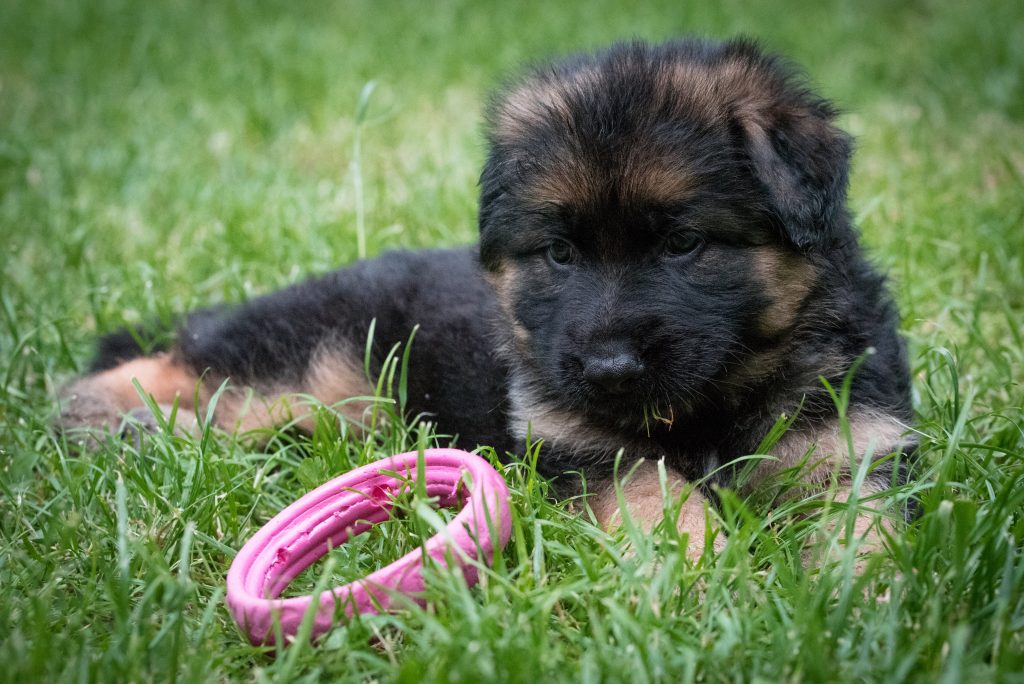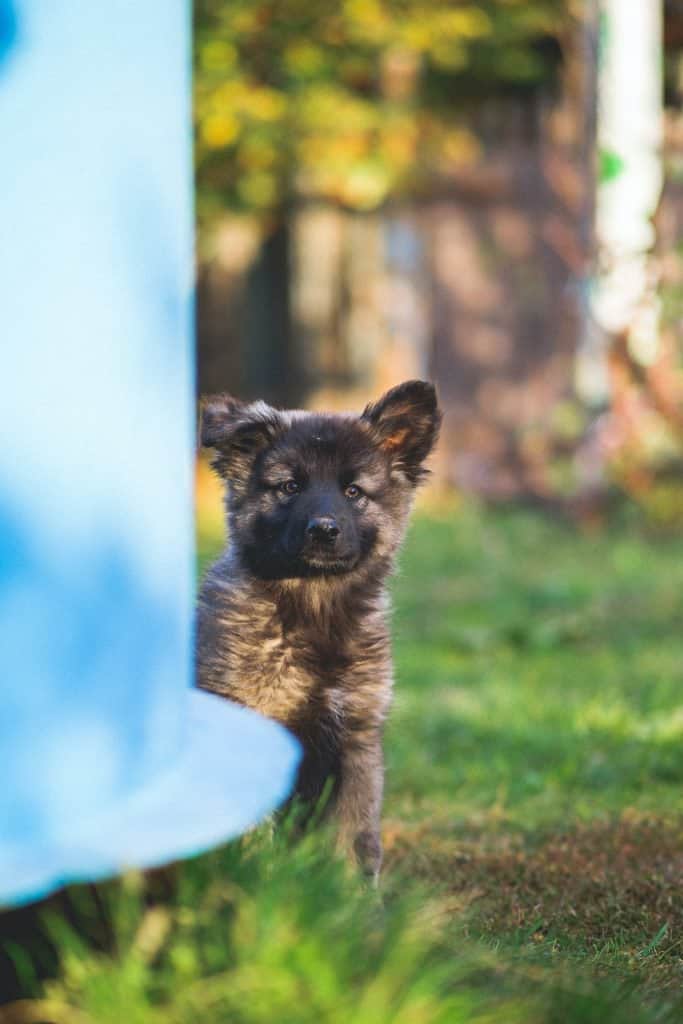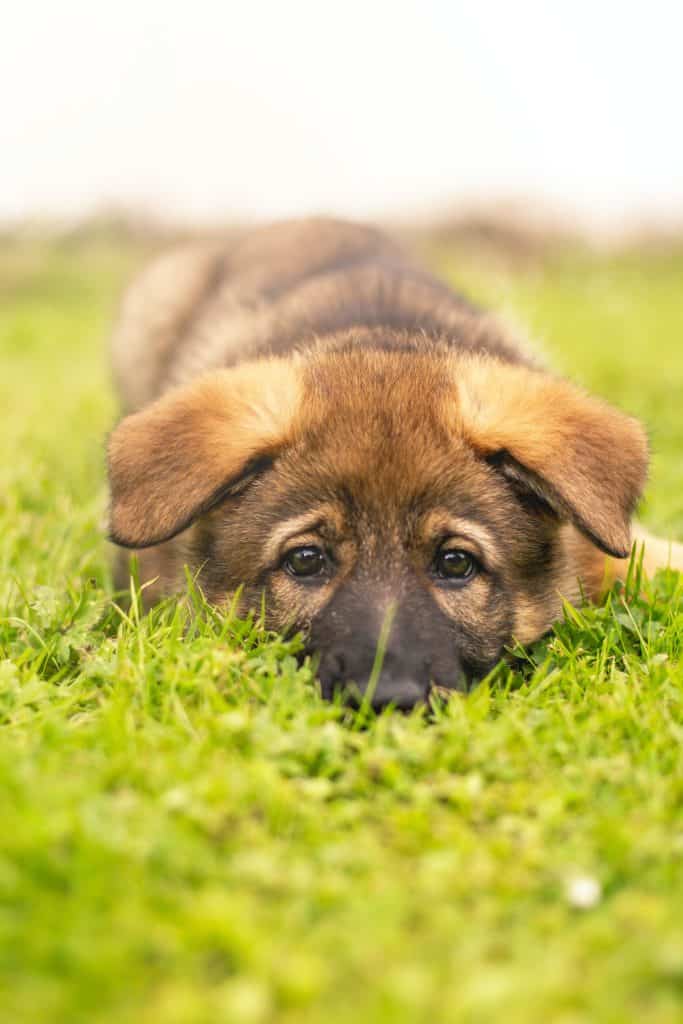Bringing home a German Shepherd puppy is an exciting and rewarding experience. These intelligent, energetic, and loyal dogs quickly become a beloved part of your family. But with all that boundless energy, you might wonder, “How much exercise does a German Shepherd puppy need?” This list-style article will break down the exercise requirements for your furry friend and help you ensure they grow up healthy and happy.
How Much Exercise Does a German Shepherd Puppy Need?
Daily Exercise Duration
German Shepherd puppies are known for their seemingly boundless energy. They are like little energizer bunnies, constantly on the move and ready to explore the world around them. Understanding their exercise needs is crucial for their overall development and well-being.
A general rule of thumb for German Shepherd puppies is to give them about 20-30 minutes of exercise every month of their age. If you have a 3-month-old puppy, you should aim for roughly an hour of exercise daily. However, this guideline is not one-size-fits-all, and it’s essential to consider your puppy’s unique characteristics and energy level.

While exercise is essential, it’s equally important to be cautious and mindful of not overdoing it, especially for puppies. Their bodies are still developing, and excessive exercise, exceptionally high-impact activities, can strain their growing bones and joints. This can lead to long-term health issues and potentially even affect their adult mobility and health.
Moderation and age-appropriate exercise are essential. Engage in activities that allow your puppy to explore, play, and expend energy, but watch for signs of fatigue or discomfort. If your puppy appears tired, giving them the rest they need is essential. Puppy playtime should always be enjoyable and stress-free, and it’s best to increase exercise intensity as they mature gradually and their body becomes better equipped to handle it.
Socialization Activities
Exercise for a German Shepherd puppy goes beyond the realm of physical activity. Socialization plays an equally vital role in their development. It’s not just about keeping them physically fit; it’s about ensuring they become well-rounded and confident dogs.
Socialization is the process of exposing your puppy to various environments, people, animals, and experiences in a controlled and positive manner. It is essential to help your puppy build proper social skills and boost their confidence.
One effective way to facilitate socialization is through playdates with other dogs. Interacting with other puppies or well-mannered adult dogs teaches your pup how to communicate, interpret body language, and engage in appropriate play. These interactions help them understand how to react to social cues and develop a more balanced temperament.

Puppy socialization classes are another valuable resource. These classes offer controlled environments where your puppy can interact with other puppies under the supervision of a trained instructor. They provide structured activities and training exercises to help your pup confidently handle new situations, people, and other animals.
The benefits of proper socialization extend beyond the puppy stage. A well-socialized German Shepherd is more likely to be comfortable in various settings, less prone to behavioral problems, and better equipped to adapt to environmental changes. It helps them become well-adjusted, confident, and friendly adult dogs, making life with your four-legged friend more enjoyable for both you and them.
Mental Stimulation
In the holistic development of a German Shepherd puppy, mental stimulation is equally crucial alongside physical exercise. These intelligent dogs possess sharp minds that crave challenges and activities to keep them engaged and satisfied.
While physical exercise is crucial for their physical health, mental stimulation is just as vital for their overall well-being. Mental exercises help them harness their intelligence and creativity, prevent boredom, and reduce the likelihood of destructive behaviors that can emerge when they’re under-stimulated.
One way to provide mental stimulation is through puzzle toys. These toys present your puppy with challenges that require problem-solving skills. They might involve figuring out how to access a hidden treat or manipulate a toy to obtain a reward. Engaging with these toys keeps their minds active and provides a sense of accomplishment when they successfully solve the puzzle.

Treat-dispensing toys are another excellent option. These toys provide mental stimulation and encourage physical activity as your puppy works to retrieve treats from inside the toy. This engages their problem-solving abilities and keeps them occupied for extended periods.
Incorporating obedience training exercises is a more structured approach to mental stimulation. Teaching your German Shepherd puppy new commands and tricks stimulates their cognitive abilities and reinforces the bond between you and your pup. It also helps establish the foundation for good behavior and responsiveness in the future.
Neglecting mental stimulation can lead to boredom and restlessness, manifesting in various ways, such as excessive barking, digging, or chewing on inappropriate objects. By providing ample mental exercises, you enhance their overall well-being and contribute to a more harmonious and enjoyable relationship with your pup.
Age-Appropriate Exercise
In the holistic development of a German Shepherd puppy, mental stimulation is equally crucial alongside physical exercise. These intelligent dogs possess sharp minds that crave challenges and activities to keep them engaged and satisfied.
While physical exercise is crucial for their physical health, mental stimulation is just as vital for their overall well-being. Mental exercises help them harness their intelligence and creativity, prevent boredom, and reduce the likelihood of destructive behaviors that can emerge when they’re under-stimulated.
One way to provide mental stimulation is through puzzle toys. These toys present your puppy with challenges that require problem-solving skills. They might involve figuring out how to access a hidden treat or manipulate a toy to obtain a reward. Engaging with these toys keeps their minds active and provides a sense of accomplishment when they successfully solve the puzzle.
Treat-dispensing toys are another excellent option. These toys provide mental stimulation and encourage physical activity as your puppy works to retrieve treats from inside the toy. This engages their problem-solving abilities and keeps them occupied for extended periods.

Incorporating obedience training exercises is a more structured approach to mental stimulation. Teaching your German Shepherd puppy new commands and tricks stimulates their cognitive abilities and reinforces the bond between you and your pup. It also helps establish the foundation for good behavior and responsiveness in the future.
Neglecting mental stimulation can lead to boredom and restlessness, manifesting in various ways, such as excessive barking, digging, or chewing on inappropriate objects. By providing ample mental exercises, you enhance their overall well-being and contribute to a more harmonious and enjoyable relationship with your pup.
Leash Training
Leash training is a crucial aspect of raising a well-behaved German Shepherd puppy. These dogs are known for their strength and determination, and with proper leash training, walks can quickly become a manageable and challenging experience.
One of the keys to successful leash training is to start early. As soon as your German Shepherd puppy is old enough to go for walks, introduce them to walking on a leash. Puppies are more adaptable and open to learning during their early developmental stages, so it’s an ideal time to instill good leash manners.
Incorporating leash training into their exercise routine is a smart strategy. Use the leash for guidance and control when your puppy gets their daily exercise, whether it’s playtime, a jog, or a leisurely walk. This ensures they burn off excess energy and helps them associate the leash with enjoyable activities.

Begin with short, cheerful walks that are enjoyable for you and your puppy. Use a properly fitted collar or harness and a leash that is the correct length for your dog’s age and size. Be patient and consistent in your training efforts. Encourage your puppy to walk beside you, using treats or praise to reward them for walking without pulling. Keep the leash loose and maintain a comfortable pace, allowing your puppy to explore their surroundings while remaining under control.
Consistency is key. Over time, your German Shepherd puppy will learn to associate the leash with enjoyable outings and well-behaved walks. They will develop good leash manners and become a pleasure for strolls. Proper leash training makes your life as a dog owner more manageable and ensures the safety and well-being of your puppy and those around you.
Off-Leash Play
Leash training is a crucial aspect of raising a well-behaved German Shepherd puppy. These dogs are known for their strength and determination; with proper leash training, walks can quickly become manageable and sometimes frustrating experiences.
One of the keys to successful leash training is to start early. As soon as your German Shepherd puppy is old enough to go for walks, introduce them to walking on a leash. Puppies are more adaptable and open to learning during their early developmental stages, so it’s an ideal time to instill good leash manners.
Incorporating leash training into their exercise routine is a smart strategy. Use the leash for guidance and control when your puppy gets their daily exercise, whether it’s playtime, a jog, or a leisurely walk. This ensures they burn off excess energy and helps them associate the leash with enjoyable activities.

Begin with short, cheerful walks that are enjoyable for you and your puppy. Use a properly fitted collar or harness and a leash that is the correct length for your dog’s age and size. Be patient and consistent in your training efforts. Encourage your puppy to walk beside you, using treats or praise to reward them for walking without pulling. Keep the leash loose and maintain a comfortable pace, allowing your puppy to explore their surroundings while remaining under control.
Consistency is key. Over time, your German Shepherd puppy will learn to associate the leash with enjoyable outings and well-behaved walks. They will develop good leash manners and become a pleasure for strolls. Proper leash training makes your life as a dog owner more manageable and ensures the safety and well-being of your puppy and those around you.
Age Milestones
Monitoring your German Shepherd puppy’s age milestones is essential for ensuring their physical and mental well-being. These milestones indicate significant developmental changes, and understanding them allows you to tailor your exercise regimen accordingly.
A German Shepherd puppy transitions into adulthood at around one year of age. It’s a crucial turning point in their life, and their body has significantly matured. By this point, their growth plates have closed, reducing the risk of injury during intense physical activities.
Once your puppy reaches this one-year milestone, you can gradually introduce more rigorous exercises into their routine. Activities like hiking and running are excellent options to consider. These exercises provide both a physical and mental challenge, as they need to navigate uneven terrain and face new environments.
Hiking, in particular, is a fantastic way to bond with your German Shepherd while enjoying the great outdoors. The natural setting stimulates their senses and offers a change of scenery from their regular walks. Gradually increase the duration and intensity of these activities, ensuring your pup remains comfortable and doesn’t show signs of fatigue or strain.

Remember that while they are now considered adults, your German Shepherd’s energy levels may still be high, and they may continue to enjoy playtime and more active pursuits. Remember that every dog is unique, and their exercise needs vary based on their disposition and overall health.
It’s crucial to stay observant and responsive to your pup’s cues. If they seem tired or are discomfort during any activity, it’s essential to provide them with breaks and rest. Overexertion can still be a concern, so it’s wise to ease them into more demanding exercises and maintain a balanced routine.
Watch for Signs of Fatigue
German Shepherds are renowned for their determination and unwavering enthusiasm. This characteristic, while admirable, can also pose a challenge for dog owners. These dogs often push themselves to their physical limits without showing fatigue. This persistence can be both a blessing and a curse, making it essential for responsible owners to pay close attention to their pup’s well-being during exercise.
Excessive panting is one of the early indicators that your German Shepherd might be reaching their physical limits. While dogs pant to cool themselves down, heavy, persistent panting can signify exhaustion. Watch if the panting seems excessive for the activity level or the environmental conditions.
Limping or signs of lameness are also crucial cues to consider. German Shepherds can be so focused on their activities that they may not immediately show signs of discomfort or pain. If you notice a limp or discomfort, it’s time to end the exercise session and give your pup the rest they need.
Another sign of potential overexertion is disinterest in play or activities they typically enjoy. If your usually enthusiastic puppy becomes lethargic or disengaged, it’s time to pay attention. They might be trying to communicate that they’ve had enough exercise and need to recover.

As a responsible owner, your role is to closely monitor your German Shepherd’s behavior and physical condition during exercise. Be aware of their endurance limits, and do not push them beyond those limits, even if they’re eager to keep going. While it’s tempting to let them satisfy their boundless energy, trying too hard can lead to fatigue, muscle strain, or even injuries.
It’s essential to balance providing exercise and ensuring their well-being. Creating a harmonious exercise routine that caters to their energy levels and physical capabilities is necessary. Always have fresh water for hydration, and avoid exercising in extreme weather conditions to prevent overheating.
Rest and Recovery
Rest is a critical component of the well-being of German Shepherd puppies. Just as it is with humans, rest and recovery play an integral role in their overall health and development. After an active day of exercise and play, ensuring that your puppy has the opportunity to rest is essential.
Rest allows your puppy’s body to recuperate and regenerate. During rest periods, their muscles repair themselves, and their energy stores replenish. This is when their growing bodies can focus on developing and maturing, which is particularly important for German Shepherd puppies, as they are a large and robust breed.
Creating a comfortable and quiet space for your puppy to relax is vital. This designated area should be free from distractions and noise, providing security and comfort. Ensure that it’s well-ventilated, and the temperature is suitable for your pup. A soft bed or blanket can make the space more inviting and cozy.

After vigorous exercise, your German Shepherd puppy will often seek out their resting spot instinctively. They may nap, stretch out, or lie down to enjoy a moment of tranquility. This is when their bodies can focus on growth and recovery, both physically and mentally.
The importance of rest extends beyond the immediate recovery from exercise. Adequate rest is crucial for their cognitive development, as it allows them to process and consolidate the experiences and knowledge gained during their active hours. This is particularly important for young puppies, as they constantly learn about their environment and how to navigate it.
Overlooking the significance of rest can lead to overexertion and increased susceptibility to fatigue and stress. In the long run, it can hinder their growth and overall well-being. As a responsible owner, recognizing the need for a balanced routine that includes exercise and rest is vital.
Consult Your Vet
Consulting with your veterinarian is the final and crucial piece of advice in ensuring the health and well-being of your German Shepherd puppy. Veterinarians are invaluable sources of information, offering guidance tailored to your specific puppy’s needs and circumstances.
First and foremost, your veterinarian can assess your puppy’s current health status. This includes checking for underlying medical conditions, identifying potential genetic predispositions, and monitoring their overall physical condition. This assessment is essential in determining your puppy’s exercise requirements, as it helps ensure that any limitations or specific considerations are considered.
Veterinarians are also well-equipped to provide breed-specific advice. German Shepherds have characteristics and potential health concerns that may impact their exercise routine. Your vet can offer insights into these breed-specific considerations and advise on accommodating them in your pup’s exercise regimen.

Sometimes, your veterinarian might recommend adjustments to your puppy’s exercise routine based on age, weight, or medical history. For example, if your puppy has previous joint issues or musculoskeletal conditions, your vet may recommend gentler exercises focusing on physical therapy.
Regular check-ups with your veterinarian are essential throughout your puppy’s development. They can help you stay updated on your pup’s health status and provide guidance on any necessary modifications to their exercise routine as they age. Your vet can also advise on the optimal diet for your pup to support their energy levels and overall well-being.
Conclusion
Understanding the exercise needs of your German Shepherd puppy is crucial for their physical and mental well-being. You’ll raise a happy, healthy, and well-adjusted adult dog by providing them with the right amount of exercise, socialization, and mental stimulation. So, enjoy your puppy’s boundless energy while it lasts, and watch them grow into the majestic, loyal companion they are meant to be!

